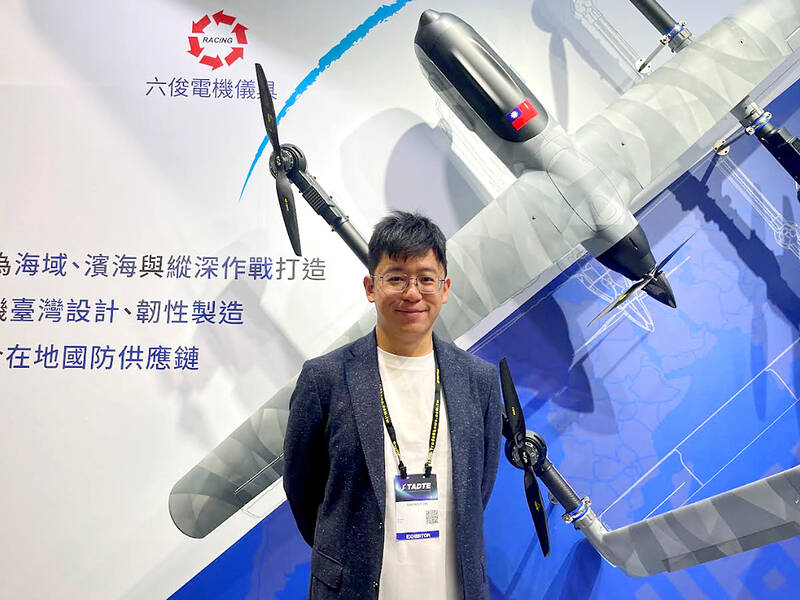DragonFly UAS Co (翔隆航太), a provider of uncrewed aircraft systems, yesterday said that revenue in the second half of this year is expected to grow two to threefold from the first half on the back of new orders for its self-developed vertical take-off and landing (VTOL) drones.
DragonFly’s drone systems are mainly used in photogrammetry, 3D modeling, construction and disaster prevention. VTOL drones can take off, hover and land vertically, without requiring a runway.
Revenue growth in the second half of this year would be driven by overseas orders of 10 to 20 units of VTOL drones after completing verification, DragonFly chief executive officer Arvin Li (李奕儒) said on the sidelines of the Taipei Aerospace and Defense Technology Exhibition in Taipei.

Photo: Meryl Kao, Taipei Times
The company’s VTOL drones are mainly for its US and European customers, including public safety agencies, military users and emergency response sectors, Li said, adding that he also sees strong domestic interest for the company’s VTOL drones for public safety and energy inspections.
With such a strong demand outlook, company revenue this year is likely to reach NT$150 million (US$4.98 million), he said, without providing the figure for last year.
DragonFly also sees strong order momentum extending into next year, with major customers in the US, Europe and Asia, after securing agency rights from US drone maker Skydio Inc in 2023, Li said.
Skydio’s products mainly target public-sector needs, such as for the police, firefighting and coast guards, as well as private-sector demand for large-scale asset management and facility inspection, he said.
About 70 percent of Skydio’s product components come from Taiwan, making it easier for the company to promote projects in the nation’s public sector, he said.
Most of the research, development and verification of its VTOL drones and Skydio products are conducted in Taiwan, with mass production supported by LCD and projector maker Qisda Corp (佳世達), one of its largest shareholders, he said.
Li said the company is working with partners to expand its business in the US and plans to set up an operations in Phoenix, Arizona, or San Francisco, California, to support after-sales services.
The company aims to adopt a “drone-as-a-service” business model to offer full solutions to customers, he added.

The US government on Wednesday sanctioned more than two dozen companies in China, Turkey and the United Arab Emirates, including offshoots of a US chip firm, accusing the businesses of providing illicit support to Iran’s military or proxies. The US Department of Commerce included two subsidiaries of US-based chip distributor Arrow Electronics Inc (艾睿電子) on its so-called entity list published on the federal register for facilitating purchases by Iran’s proxies of US tech. Arrow spokesman John Hourigan said that the subsidiaries have been operating in full compliance with US export control regulations and his company is discussing with the US Bureau of

Taiwan’s rapidly aging population is fueling a sharp increase in homes occupied solely by elderly people, a trend that is reshaping the nation’s housing market and social fabric, real-estate brokers said yesterday. About 850,000 residences were occupied by elderly people in the first quarter, including 655,000 that housed only one resident, the Ministry of the Interior said. The figures have nearly doubled from a decade earlier, Great Home Realty Co (大家房屋) said, as people aged 65 and older now make up 20.8 percent of the population. “The so-called silver tsunami represents more than just a demographic shift — it could fundamentally redefine the

Taiwan’s foreign exchange reserves hit a record high at the end of last month, surpassing the US$600 billion mark for the first time, the central bank said yesterday. Last month, the country’s foreign exchange reserves rose US$5.51 billion from a month earlier to reach US$602.94 billion due to an increase in returns from the central bank’s portfolio management, the movement of other foreign currencies in the portfolio against the US dollar and the bank’s efforts to smooth the volatility of the New Taiwan dollar. Department of Foreign Exchange Director-General Eugene Tsai (蔡炯民)said a rate cut cycle launched by the US Federal Reserve

Businesses across the global semiconductor supply chain are bracing themselves for disruptions from an escalating trade war, after China imposed curbs on rare earth mineral exports and the US responded with additional tariffs and restrictions on software sales to the Asian nation. China’s restrictions, the most targeted move yet to limit supplies of rare earth materials, represent the first major attempt by Beijing to exercise long-arm jurisdiction over foreign companies to target the semiconductor industry, threatening to stall the chips powering the artificial intelligence (AI) boom. They prompted US President Donald Trump on Friday to announce that he would impose an additional